‘Battlestar Galactica’ EP David Eick Revisits 5 Episodes That Remain Relevant
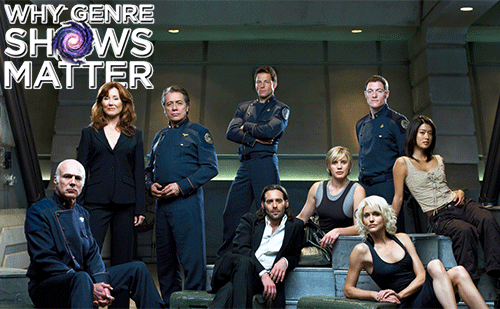
Leading up to the 20th anniversary of the March 10, 1997 premiere of Buffy the Vampire Slayer, Yahoo TV is celebrating “Why Genre Shows Matter” and the history of how these shows have tackled universal themes (i.e. how much high school sucks) and broader social issues.
On the surface, Battlestar Galactica is the story of a ragtag fleet of interstellar travelers, searching the cosmos for a new home after their old world was destroyed by a robot army. At least, that’s the basic premise shared by the 1978 version of the series that aired on ABC for a single season, and its reboot, which aired on the Sci-Fi Channel (later rechristened Syfy) from 2003 to 2009, first as a miniseries and then an ongoing four-season show.
But the latter incarnation also doubles as a history of early 21st century America, as showrunners Ronald D. Moore and David Eick filtered real world events through the lens of genre television. “Both Ron and I were political news junkies, and really connected about that even before we started Battlestar,” Eick tells Yahoo TV. “What was going on in the world — like elections and troop movements in the Middle East — sucked a lot of oxygen out of any room that we were in together, so it naturally began to infect what the stories were about.”

Certainly, watching Battlestar Galactica from the vantage point of 2017 — which you can do on Hulu, where the entire four-season run is available to stream — is akin to skimming news headlines from a turbulent decade that saw America confronting divisive events like 9/11, the Iraq War, and the administration of George W. Bush. And those real world parallels didn’t go unnoticed while the show was airing; in fact, mere days before the 2009 series finale, the cast and crew of Galactica — including stars Edward James Olmos and Mary McDonnell, who played Commander William Adama and President Laura Roslin respectively — were guests at the United Nations for a celebration of the show’s provocative political commentary.
Reflecting on the show eight years later, Eick insists that Galactica‘s social relevance was more of a “natural evolution” than a hard-and-fast plan. “To a certain degree, it became an outlet for us, because the goings on in the real world were getting heated and heightened, and suddenly we had this kind of weaponized narrative to express reactions to it,” he says. “Once we got a handle on it, with a little more self-awareness and deliberation, we started to purposely attempt to subvert expectations about who the characters represented in the real world.” There are times when Eick, who’s now an executive producer on Freeform’s Beyond, misses having that particular sci-fi universe through which to express his thoughts on our real one. “I sat in on a small salon with Henry Kissinger and listened to him talk about China,” he says. “It made me wish I had a Battlestar TV show to write an episode about everything he was saying!”
To illustrate how Galactica tackled social issues in a genre context, we spoke with Eick about five specific episodes that used the real world as a jumping off point to tell alternately thrilling and thoughtful sci-fi stories.
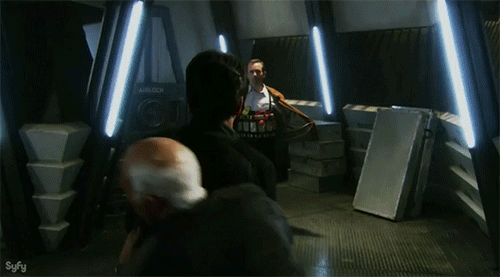
The Issue: Suicide Bombing
The Episode: “Litmus” (Season 1, Episode 6)
The first inkling that the new Battlestar Galactica is going to venture to thematic places its predecessor hadn’t comes in the opening moments of “Litmus,” when a Number Five Cylon model strolls through Galactica in a suicide vest, setting it off when Adama confronts him. Viewers who watched that episode live when it premiered on Feb. 11, 2005, could have been forgiven for thinking the show had been interrupted by a “Breaking News” bulletin. At that point, the U.S. military was two years into the Iraq War, and reports of suicide bombings were a regular staple of news coverage. Within the world of the show, that incident instigated a security crackdown, as well as the organization of an independent tribunal that felt empowered to make examples of those it deemed responsible for the attack. In that way, the episode is actually less about the bombing, and more about the reaction — or, as some might say, overreaction — it inspired.
Interestingly, Galactica would revisit the subject of suicide bombing during the “New Caprica” arc of Season 3. Only this time, the bombers were our supposed heroes. In order to thwart the Cylon invasion of their new home, the human fleet resorted to the same guerilla tactics that had previously been used against them. The dramatic power of that reversal is made all the more potent because of an episode like “Litmus.”
Eick: I would call that [“Litmus” episode] “kicking the tire.” It was more of a situational echo chamber; a specific kind of violent act that was definitely going to ring the bells of anyone watching the 11 o’clock news, but didn’t really go beyond that. It was just that event, and then we moved on and told the story. There’s no question that it was allegorical in terms of what was happening in the world, but it was somewhat limited to the events of that 45-minute story.
Generally, I would be on the front lines to deal with the network’s first reaction [to an episode], and I do remember that incident being somewhat controversial. Not as controversial as other debates we had with the network, [but] their concern was that we not be viewed as cloying or attempting in any way to disrespect the reality of the incident. That was the only concern, and it was our concern, too.
The first season was such a fight to get greenlit that by the time we were finished with those 13 episodes, we felt like we had done 1,000. So when they came to us in the second season and said, “Do 20,” it was terribly daunting. After we did those 20, the last thing we wanted to do was think about Season 3, but we had to. The “eureka” moment about Season 3 was choosing to make the season of the Cylon’s point of view. Thematically, we would be seeing the world from a vantage point where we may find ourselves actually agreeing with the Cylons. That woke us back up and, in a way far more purposeful than in previous seasons, made us sink our teeth into the allegory. [Now] the humans are the insurgents, and we are definitely telling the story in this world that parallel events in our world. It’s not an accident and we’re not being cute either. We’re making a statement about something, which is forcing you to sympathize with the side that’s [using] improvised explosive devices.
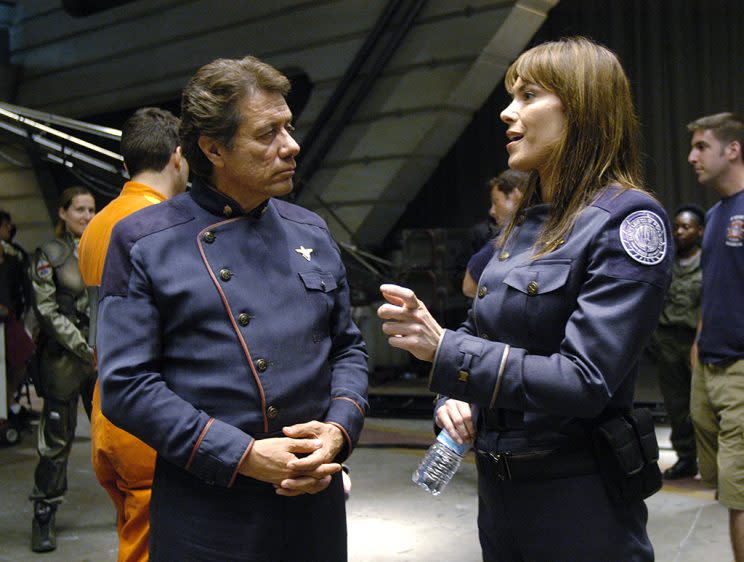
The Issue: Military Dictatorship
The Episode: “Pegasus” (Season 2, Episode 10)
After assuming that they’re the only survivors of the Cylon attack on the Twelve Colonies, the fleet is thrilled to discover the existence of another military vessel: the Battlestar Pegasus, commanded by Admiral Cain (Michelle Forbes). But that joy quickly turns sour when it becomes clear that her wartime experiences have left Cain far less open to the idea of sharing power in a tenuous democracy. Instead, she implements top-down rule, ignoring both Adama as well as President Roslin as she pursues her own agenda. Cain’s moral authority is called further into question when it’s discovered that she’s ordered the systematic torture of a Number Six model, Gina (Tricia Helfer). The treatment that this designated enemy combatant is subjected to immediately recalls the horrific abuses of Iraqi prisoners at Abu Ghraib, a story that broke in the spring of 2004, a year before “Pegasus” premiered.
Eick: I recall the heart of that episode emerging from a place where we felt that we needed to challenge Adama in a way that he hadn’t been challenged yet. He couldn’t be challenged by Laura or by his son [Apollo] or by anybody else [on the Galactica]. He could really only have someone literally pull rank on him. A similar thing happened in an episode of the original series, so we were excited there was an opportunity to give that show a nod, number one. Number two, to put a woman in the role [of Cain] was exciting. And thirdly, [we wanted] to show by contrast the greatness of Adama. How else could you really appreciate the valor, courage, and decency of this man unless you can see how he might have been? I think those principals were more at work with “Pegasus” than a political or sociological statement.

Once we got started looking at the details of the story and asking ourselves how to make it an effective piece of drama, then yes, we were inspired by events moving us emotionally in the real world. I’ll tell you, the reason [the Gina storyline] works is because Tricia Helfer rose to the occasion. She had never done anything like that, but we frequently did that on Battlestar; we threw a lot of characters into the deep end of the swimming pool just to see what would happen. What’s remarkable about Tricia is that she would do those scenes, and on a dime snap out of it, tell you a dirty joke, and go have lunch. [Director] Michael Rhymer chose angles and positioned her in such a way that you couldn’t help but feel like you were watching Abu Ghraib. That could have been shot and performed any number of ways, and it may not have had quite the same effect. In this particular case, I would attribute a great deal of that metaphorical power to the execution, to the choices that were made on the set and on the day.
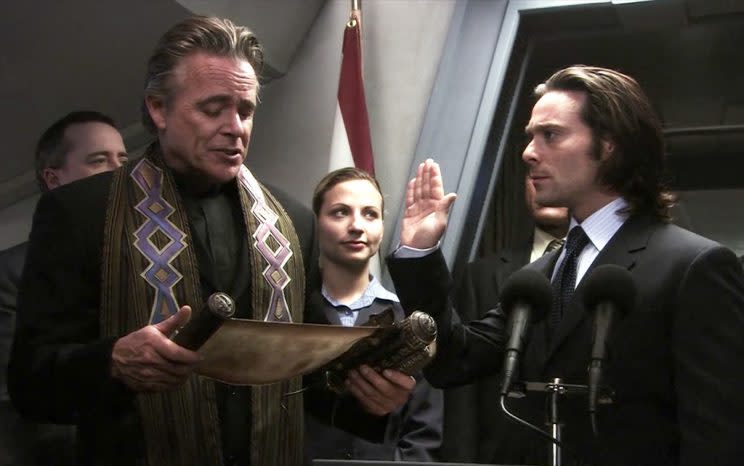
The Issue: Electoral Fraud
The Episode: “Lay Down Your Burdens, Part 2” (Season 2, Episode 20)
Stop us if this sounds familiar: Thanks to the timely intervention of a bombshell piece of information — in this case, the discovery of a habitable planet — the fleet’s contentious presidential election swings in favor of a political outsider rather than the more experienced female candidate. Since the second half of Galactica‘s Season 2 finale originally aired in March 2006, a full decade before the 2016 Presidential election and its last-minute FBI letters, we’ll have to chalk those similarities up to an uncannily accurate bit of foreshadowing.
But what happens next is inspired by the ghosts of elections past, rather than those yet to come. When it becomes clear that Gaius Baltar (James Callis) will defeat Roslin, the incumbent President attempts to preserve the status quo by okaying an operation to “lose” her rival’s winning 5,000 votes. It’s the ever-honorable Lt. Gaeta (Alessandro Juliani) who discovers the fraud while closely studying ballot totals, much like the nation did in the wake of the 2000 election when George W. Bush and Al Gore were separated by a mere 537 votes.
Eick: [The 2000 election] was not the outcome that most of us wanted and, furthermore, kind of a terrifying exhibition of authoritarianism from the judicial branch. It was such a scary and depressing thing that it was as though we needed to exorcise it through these episodes. At a certain point, we had the election take up much more of the narrative than it wound up being. It became a bit too navel gaze-y and talky. It felt more about us expressing our rage at the situation than telling a story with some momentum. We had to go back and really think through a story to layer and thread into that situation so that it wouldn’t feel like an echo chamber of the actual election.
I can’t remember at what point that specific idea [of discovering New Caprica] emerged, and that that circumstance would dovetail into Baltar’s inevitable election. It was great, because it’s real. We know that those things happen to the least deserving amongst us frequently; anybody who has every checked the newspaper to see what a competitor’s accomplished that they haven’t yet knows what I’m talking about. When you see somebody get something that seems ill-deserved, it grabs you. I think that story point rings true in a way that recent events prove.
The only thing I posted on my Facebook page after the [2016] election was, “Movies and music are about to get crazy good again.” I know that was the sentiment of a lot of people; it’s certainly true that when you go through long periods of relative peace and quiet you can kind of forget the importance of talking about what’s going on. Then when something unexpected or loud or disruptive happens, suddenly science fiction has a whole other agenda and purpose. A science fiction piece made today is going to have the potential to be much more profound than a piece of science fiction from six months ago. That’s just the reality.
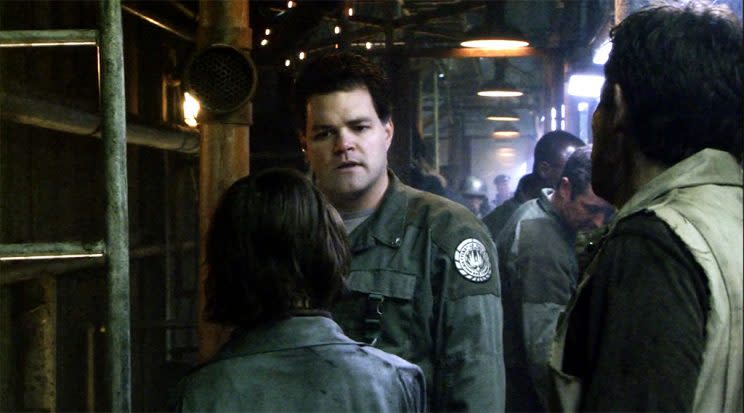
The Issue: Class Conflict
The Episode: “Dirty Hands” (Season 3, Episode 16)
Although Galactica is just one ship in a larger fleet, the demands of serialized storytelling mean that the majority of the show’s action takes place in its corridors. What’s happening aboard the other vessels is largely left up to the imagination. But Eick and Moore did make a point of venturing off Galactica whenever possible to give a sense of what daily life was like elsewhere in the fleet. The plot of “Dirty Hands,” for example, involves the unpleasant circumstances aboard the refinery ship the Hitei Kan, where laborers of all ages (including children) endure long hours and perilous surroundings to produce a constant supply of fuel for the other spacecrafts.
It’s a harsh, thankless existence compared to the relative comforts enjoyed by those in the military and civilian government. So it’s no wonder that the citizens aboard the Hitei Kan harbor the kinds of resentments that are often cited in discussions of the cultural divides between Red States and Blue States or the working classes and the upper classes. That also makes them susceptible to the persuasive arguments of ex-President Baltar, who has refashioned himself as the voice of the oppressed.
Eick: Part of the original sale of the show was that we would be investigating and experiencing life on the other ships for no other reason than to give the audience and the network some visual variety. The biggest barrier standing between us and a pick-up [at the time] was, “How do you force network executives who don’t want to look at a spaceship to be inside of a spaceship all the time?” And our answer was, “We’ll go to different ships!” The truth is, we could never afford to do it. Beyond that, we never had a reason to do it other than episodic circumstances. Maybe you could do an episode about the ship that carries all the food, but otherwise, there wasn’t a compelling reason to go to the other ships.
What happened in Season 3, though, was that we were able to marshal enough resources to say, “Okay, now we actually have a reason to experience what life is like on these other ships.” Class had become important in the season’s discussion of who is the decision maker — and who died and put them in the decision making chair. In that regard, the audience needed to see other people, other ships, and other points of view in order to sort of reconcile that drama. The only significance of it being a mining ship had to do with how do you make the situation make sense with the larger mission of the fleet. To the extent that it’s a class theme, it’s a mining ship because miners aren’t admirals, captains, and lieutenants, and they have different challenges and different things to worry about.
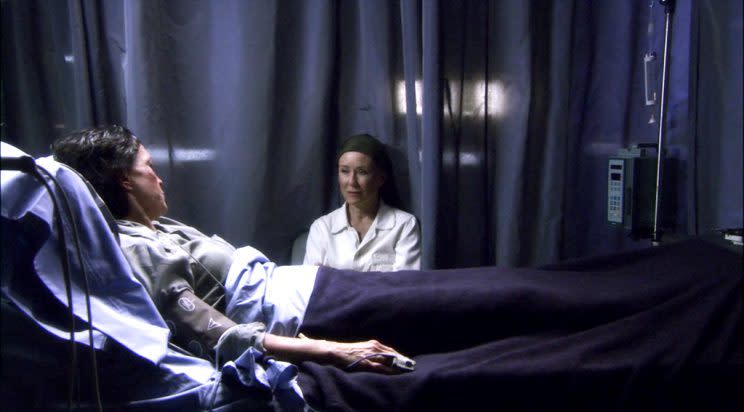
The Issue: Religion
The Episode: “Faith” (Season 4, Episode 8)
By the fourth and final season, some of Galactica‘s more pointed political commentary started to fall away as the writers had to focus on the story’s endgame. Central to the planned resolution was the issue of religious belief, something that had been part of the show since the beginning and took on an increased prominence in the last year to the annoyance and outright hostility of a sizeable segment of fans. An episode like “Faith,” where a dying Roslin has an extended conversation about God with another patient at death’s door, is an example of the earnest, if sometimes awkward, way that Galactica sought to wrestle with religion as the show approached the end of its lifespan.
Eick: It started with a comment made by the head of the studio when he read the script for the Galactica miniseries. There was a line from Six to Baltar in which she said, “God is love.” It was kind of a throwaway line, just sort of to be provocative. This executive gave us a note that we took and ran as fast as we could with in the next re-write. His basic thought was, “What if the Cylons were believers in a single god, unlike their creators who were polytheists? And what if the Cylons believed, as we understand from an evolutionary perspective, that the only way they can truly move on to their next evolutionary stage is to rid themselves of their parents? In that sense, they’re following God’s plan, and they’re enshrouded in a holy mission.” That suddenly allowed us a great deal of narrative and character flexibility, because once you introduce a theological agenda, all kinds of crazy behavior can be justified and rationalized. So it was a perfect kind of note from an executive who was willing to push us in an unorthodox direction.
This was baked into the cake from a very early point, so when you get to Season 4, and start trying to play out the various theological storylines that you’ve introduced, you suddenly go from the metaphorical to the literal and specific. Once you do that, you run into problems that have to do with certain peoples’ preconceptions about religion and how it’s used and what it means, and other people who are viewing this as a very secular tale. You have two different perspectives on it, so by the time you resolve it, there’s no version that leaves everyone happy because you touched a third rail called religion.
I think if Ron and I were known as outspoken conservatives, the appropriate ending to the show may have been the opposite [of what we did]. It may have been a realization that they had been misled by the folly of their arcane religious beliefs. When you have two godless liberal Hollywood TV guys telling a story that involves religion, the last thing you expect is that the resolution is going to involve any kind of embrace of that idea. I was hopeful that we would surprise them. It wasn’t the network’s favorite choice, because when you’re dealing with religion, you’re dealing with controversy whether you call it Christianity or you call it perhaps something else.
Battlestar Galactica is currently streaming on Hulu.
Read More from Yahoo TV:
‘Buffy the Vampire Slayer’ Turns 20: Joss Whedon Looks Back (And Forward)
Review: ‘The Americans’ Season 5 Digs its Spies into a Hole
‘The Walking Dead’ Postmortem: Director Greg Nicotero Talks ‘Say Yes’


